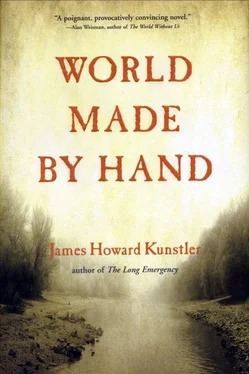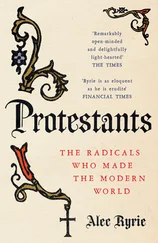Walking, it was impossible to not pay attention. On a mild luminous evening like this, the landscape came alive. The crickets had started up. In the distance a last glimmer of sun caught the top of Pumpkin Hill where men were still out mowing the first hay crop on the Deaver farm. You could hear their horses from down where we were, and someone was singing while he worked. Washington County is a terrain of gentle hills and close valleys that grows more rugged as you get east over toward the Vermont border, where the Green Mountains begin in earnest. In the early twenty-first century, farming had all but died out here. We got our food from the supermarket, and not everybody cared where the supermarket got it as long as it was there on the shelves. A few elderly dairymen hung on. Many let their fields and pastures go to scrub. Some sold out to what used to be called developers, and they’d put in five or ten poorly built houses. Now, in the new times, there were far fewer people, and many of the houses outside town were being taken down for their materials. Farming was back. That was the only way we got food. Ben Deaver employed at least twenty men from town on his farm. You could smell the horses down where we were on the bridge. Sometimes the whole world smelled of horse. It was my fond wish to own one some day.
Across the bridge, Lovell Road came to a T at old Route 29, which used to be the main route between the Hudson Valley and Arlington, Vermont. It was a standard state two-laner. We headed west toward town on it. When the sun finally went down, the sky above the hills remained pale blue, the cloud bottoms all salmon and orange. We walked right down the middle of the highway, over the faint ghost of the double yellow line. After years of neglect the pavement was broken with great fissures and potholes the size of a bathtub. In some stretches, it had gone back to dirt. Loren and I were both lost in our own thoughts when we heard horses at a distance coming up behind us. We turned together.
It was an open cart with two wooden-spoked, iron-rimmed wheels, not the old automobile tires that you used to see on a common utility wagon. You could still find rubber tires here and there, but you couldn’t get patch kits or the kinds of adhesives that would stand up to a repair job anymore, so we had no choice but to go back to wooden wheels with iron rims. This sort of vehicle was sometimes referred to as a Foley rig. I couldn’t tell you who Foley was, but that’s what it was called. There were stories, as about so many things in these new times, where the actual facts were sparse or elusive, but they named the rig after him. There were two figures aboard, a man driving and a woman beside him.
The rig came trotting out of the twilight, bouncing on the rough road, until it reached us and the driver slowed his team to a walk. They were fine, tall, stout matched blacks with some feathering on their lower legs, a mix of some kind. Since the world changed, there had not been much time to breed horses, so around here anything distinct from the American quarter horse or a common draft animal tended to stand out. These looked like they had some Percheron or other cold blood in them and their size, at least sixteen hands, was another sign. The driver brought them to a halt beside Loren and me.
He was a stranger, a clean-shaven, middle-aged man, with a nose too small for his face. It made him look oddly boyish. Among men in Union Grove, beards were the norm so any clean-shaven man was apt to look young. He took off his broad-brimmed straw hat so as to show off, or so it seemed, his full head of black hair with a few strands of gray at the temples. His skin had a pinkish cast, as though he spent a lot of time indoors.
“Brother Jobe,” he said, reaching down from his seat to press our flesh like a politician. We would learn later that he spelled it this way, with an e on the end.
“Loren Holder’s the name.”
“How’d you do?” Brother Jobe said.
“Fine,” Loren said. “Beautiful evening.”
“No, I meant how did you make out fishing?”
“Oh, pretty good,” Loren said.
“I hear the river’s better’n it ever was before,” Brother Jobe said.
“It’s quite good,” Loren said. “Less angling pressure nowadays.”
“I haven’t had the time to try it myself. Busy tending to my flock.”
I couldn’t help glancing at the young woman beside him. She had been sitting very still, like a startled doe, as if stillness might enable her to remain unscrutinized. Both she and Brother Jobe were dressed in the severe clothing of the pious. He had on a black sack suit, a cotton shirt with collar points, and a floppy black bow tie. She wore a straw hat secured under her chin with a black ribbon. She’d gathered her thick red hair into a single braid. Her skin was so pale as to appear luminous in the low light. The longer I looked the more I noticed that she had a good figure within her plain muslin blouse. Though it was buttoned to her throat, you could see the shadows of her flesh within. Her delicate face suggested she was not much more than sixteen. Few young women were left in our town. The Mexican flu had been especially vicious among the young, though death by other means had not spared any age group.
“Say, aren’t you the chief over at First Congregational?” Brother Jobe asked Loren.
“I’m the minister there, yes.” Loren said. “How’d you know?”
“I’ve got an outfit of my own,” Brother Jobe said, as if that answered the question.
“Oh?” Loren said. “Whereabouts?”
“Why, right here in Union Grove.”
Loren cut a puzzled glance my way.
“Bought the old high school day before yesterday,” this Brother Jobe said.
With the recurrent sickness and the problems with electricity and everything else, the sprawling, low-slung high school complex at the north edge of town had fallen into disuse. Once, it had collected pupils spread out over half the county in a fleet of shiny yellow buses. The small number of children in our community went to the church school now.
“That’s a surprise,” Loren said.
“We’ve been on a hard and prayerful search,” Brother Jobe said. “This place looked about perfect.”
“How many of you are there?”
“Seventy-three adults.”
“Where’d you come from.”
“We were last in Pennsylvania.”
“Why did you leave?” I said.
Brother Jobe regarded me closely for a moment, as though my question were impertinent.
“We weren’t comfortable there,” he said. “Who are you?”
“Name’s Robert Earle.”
“Robert Earle what?”
“Just Earle. That’s the family name.”
“Oh? Down where we’re from that’d be a man’s given name.”
“Like Billy Bob.”
“Exactly.”
“I take it you hail from Dixie,” Loren said.
“Indeed I do,” Brother Jobe said, running a sleeve across his damp brow. It must have been uncomfortable for him in a suit on a warm summer night like it was.
“A troubled place these days, isn’t it?” Loren said.
“There’s plenty of mischief to go around this poor country of ours. What’s left of it.”
’We don’t get much news of the outside anymore,” Loren said. “The electric’s hardly on these days.”
“We’ve noticed,” Brother Jobe said. “But you’ve got something here maybe even more valuable.”
“Yeah?” Loren said. “What’s that?”
“Peace and tranquillity.”
“The last real news we had was when the bomb went off in Los Angeles.”
“California got dealt a bad hand, all right,” Brother Jobe said, “but things are rough from sea to shining sea. It’s no fun in Phoenix or Albuquerque either, so I’ve heard. From Texas clear to Florida, there’s folks shooting each other and trouble between the races and all like that. Seems like the law is on the run everywhere. We were on our way up out of Virginia when the other bomb hit Washington, D.C. Pennsylvania wasn’t no picnic after that, I can tell you. We tried it for more than two years, but it wasn’t any go for us there. We pulled out the end of April.”
Читать дальше












